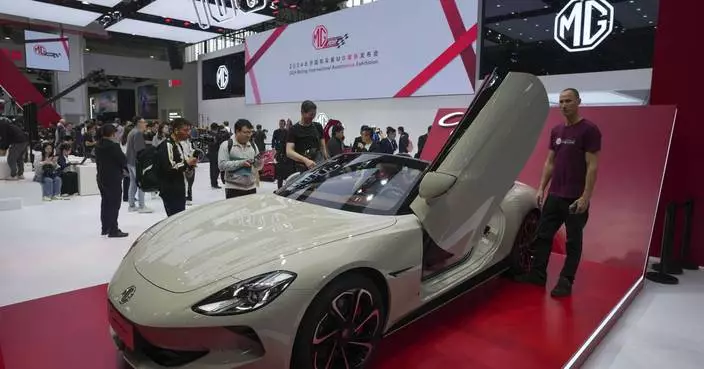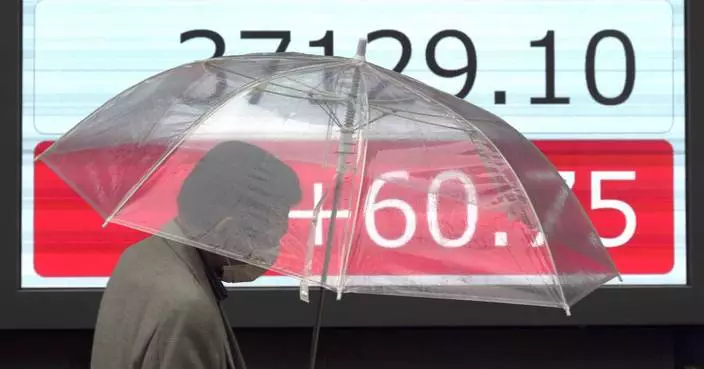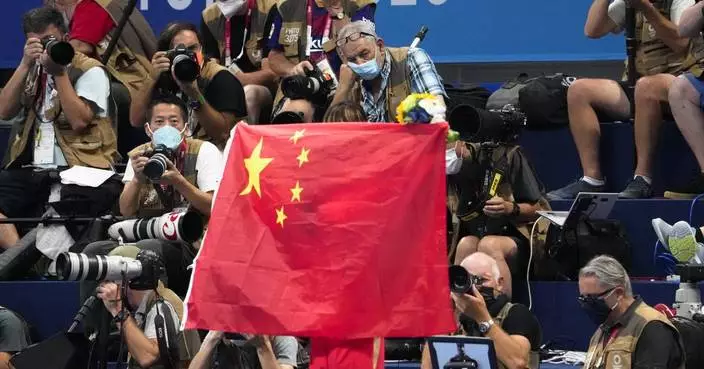A hygiene scandal engulfing luxury hotels in China's Beijing has rocked the country’s high-end tourism industry. Despite massive potential for growth and huge investment, recent years have seen a slowdown in the Chinese luxury hotel market. Could this latest controversy deal even more damage?
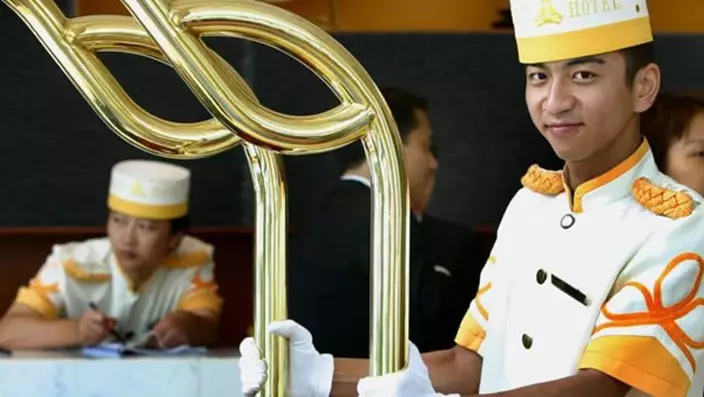
Photo/China Daily
Undercover investigation team Lanmei Test recently revealed how five luxury hotel brands in Beijing – including InterContinental, JW Marriott and Hilton – failed to change bedding in guest rooms, and did not even wipe down toilet seats after guests had checked out.
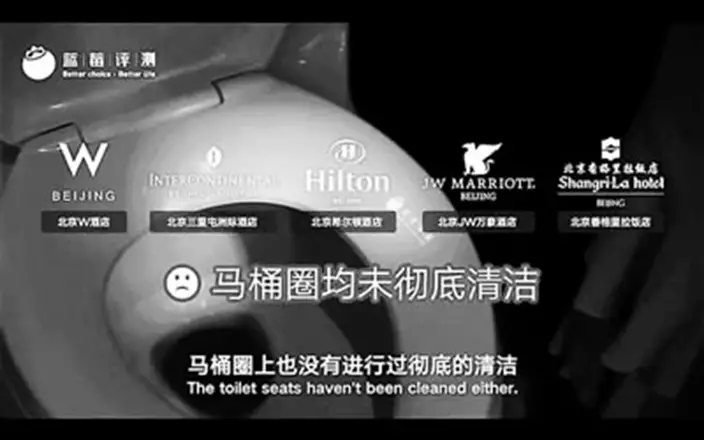
Image from the undercover investigation by Lanmei Test. /Lanmei Test Photo
On Wednesday, local media reported that Beijing health authorities would take a look at all five star hotels in the city, following separate internal investigations by some of the hotels featured in Lanmei’s investigation.
The scandal, which follows a 2013 BBC report accusing Kempinski and InterContinental of allowing prostitution rings to operate in some of their Chinese hotels, could seriously harm the reputations of leading global brands in the Chinese luxury hospitality market, which has seen an investment boom in recent years.

Hygiene inspectors investigate a hotel room. /China Daily Photo
A report by IBIS World estimates that hotel revenue in China will be worth 56.2 billion US dollars this year. China Daily reports that Marriott International plans to open 53 more luxury hotels in China, bringing its total presence in the country to 99.
Glut in supply
While many major international brands still see massive potential in China, existing luxury hotels are suffering a glut in supply. Jin Jian of Deloitte China warned China Daily that 50 percent of four- and five-star hotels in the country are looking to be sold because of “poor business performance.”
While the luxury hotel industry continues to grow, it can hardly be described as a boom. A report by website hotelsight found that in the first half of 2017, average occupancy rates in China’s five-star hotels stood at 57.39 percent, representing a year-on-year increase of only 2.79 percentage points.
Revenue per average room (RevPAR) in the first half of the year stood at 287.49 yuan (44 US dollars), falling from 300.40 yuan (46 US dollars) in the last six months of 2016.
While Chinese tourists typically spend more in the last half of the year (because of the October Golden Week vacation), revenues are clearly struggling to increase. Year-on-year, average RevPAR for the first half of 2017 increased by only 0.99 yuan (15 US cents) nationwide.
Struggling to increase
Despite Marriott’s impressive expansion plans, 2016 was also relatively disappointing. Its annual report shows occupancy rates for the Greater China region at 67.5 percent – disappointing when compared to the 75.2 percent occupancy rate seen in the rest of the Asia-Pacific region.
Marriott’s RevPAR in Greater China was 89.17 US dollars, significantly lower than the rest of Asia-Pacific (112.69 US dollars) and the worldwide average (128.37 US dollars).
One promising indicator is the Greater China region’s average daily rate (ADR), which increased year-on-year by 5.1 percent. This was by far the biggest increase anywhere for Marriott (the worldwide ADR increase was only 0.1 percent).
However, Greater China’s ADR was 132.16 US dollars, much lower than the worldwide ADR of 177.11 US dollars.
The Financial Times reports that InterContinental has also seen its business in China stutter, with its Greater China RevPAR increasing by only 0.3 percent in 2015, compared to 4.4 percent worldwide.
The Chinese luxury market is clearly still lagging behind more established markets, but the rapid expansion of luxury hotel brands in the country represents a strong belief in China’s rapidly expanding middle class as a source of future profits.
Luring China's middle class
McKinsey estimates that by 2022, China will have a middle class population of more than 550 million, while a Ctrip study published in August claimed that the post-90s generation contributed to 50 percent of five-star hotel sales in the weeks before Chinese Valentine’s Day (August 28).
However, these promising trends do not necessarily mean luxury hotels will reap all the rewards.
A report by AT Kearney says that while China’s hotel industry still has plenty of room to grow, mid-scale and budget hotels will see the biggest growth in the next decade. By 2022, luxury hotels in China will be worth an impressive 24.8 billion US dollars, but this pales in comparison to a projected 56.8 billion US dollar market for mid-range accommodation.
With the development of online holiday rentals like Airbnb and concepts like ecotourism, adventure travel and boutique hotels, Chinese consumers will have more choice, and this will force luxury hotel chains to rebrand and adapt to the changing demands of the Chinese market.
If luxury brands can’t even maintain basic hygiene standards, Chinese consumers – who are well known for brand loyalty – could be put off from some of the world’s biggest hotel chains for good.
SHANGHAI (AP) — U.S. Secretary of State Antony Blinken raised what the U.S. describes as unfair Chinese trade practices during his first full day of meetings in China on Thursday with local government officials in the financial hub of Shanghai.
Blinken met with the city's top official, Communist Party Secretary Chen Jining, and “raised concerns about (Chinese) trade policies and non-market economic practices," the State Department said in a statement.
It said he stressed that the United States seeks healthy economic competition with China and "a level playing field for U.S. workers and firms operating in China.”
“The two sides reaffirmed the importance of ties between the people of the United States and (China), including the expansion of exchanges between students, scholars, and business,” it said.
China's multibillion-dollar trade surplus with the U.S. along with accusations of intellectual property theft and other practices seen as discriminating against U.S. businesses in China have long been a source of friction in relations.
China, for its part, has objected strongly to U.S. accusations of human rights abuses and Washington's support for Taiwan, the self-governing island that Beijing considers its own territory and warns could be annexed by force.
Blinken also spoke with students and business leaders before flying to Beijing for what are expected to be contentious talks with national officials, including Foreign Minister Wang Yi and possibly President Xi Jinping.
Blinken arrived in Shanghai on Wednesday shortly before U.S. President Joe Biden signed a $95 billion foreign aid package that has several elements likely to anger Beijing, including $8 billion to counter China’s growing aggressiveness toward Taiwan and in the South China Sea. It also seeks to force TikTok’s China-based parent company to sell the social media platform.
China has railed against U.S. assistance to Taiwan and immediately condemned the aid as a dangerous provocation. It also strongly opposes efforts to force TikTok’s sale.
Still, the fact that Blinken made the trip — shortly after a conversation between Biden and Xi, a visit to China by Treasury Secretary Janet Yellen and a call between the U.S. and Chinese defense chiefs — is a sign the two sides are at least willing to discuss their differences.
“I think it’s important to underscore the value — in fact, the necessity — of direct engagement, of speaking to each other, laying out our differences, which are real, seeking to work through them,” Blinken told Chen.
“We have an obligation for our people, indeed an obligation to the world, to manage the relationship between our two countries responsibly,” he said. “That is the obligation we have, and one that we take very seriously.”
Chen agreed with that sentiment and said the recent Biden-Xi call had helped the “stable and healthy development of our two countries’ relationship.”
“Whether we choose cooperation or confrontation affects the well-being of both peoples, both countries, and the future of humanity,” he said.
Chen added that he hoped Blinken was able to get a “deep impression and understanding” of Shanghai, a city of skyscrapers, ports and more than 25 million people that is a magnet for commercially ambitious young people from China and abroad.
Most recently, the U.S. has raised concerns that potential overcapacity in Chinese industries — such as electric vehicles, steel and solar panels — might crowd out U.S. and other foreign manufacturers.
Shortly after arriving, Blinken attended a Chinese basketball playoff game between the local Shanghai Sharks and the Zhejiang Golden Bulls, with the home team losing in the last seconds in a 121-120 nailbiter.
With the U.S. presidential race heating up, it’s unclear what ramifications a victory for either Biden or former President Donald Trump might have for relations. But Trump could deepen a trade war he started during his first term. His tough rhetoric on China and isolationist approach to foreign policy could ramp up uncertainties.
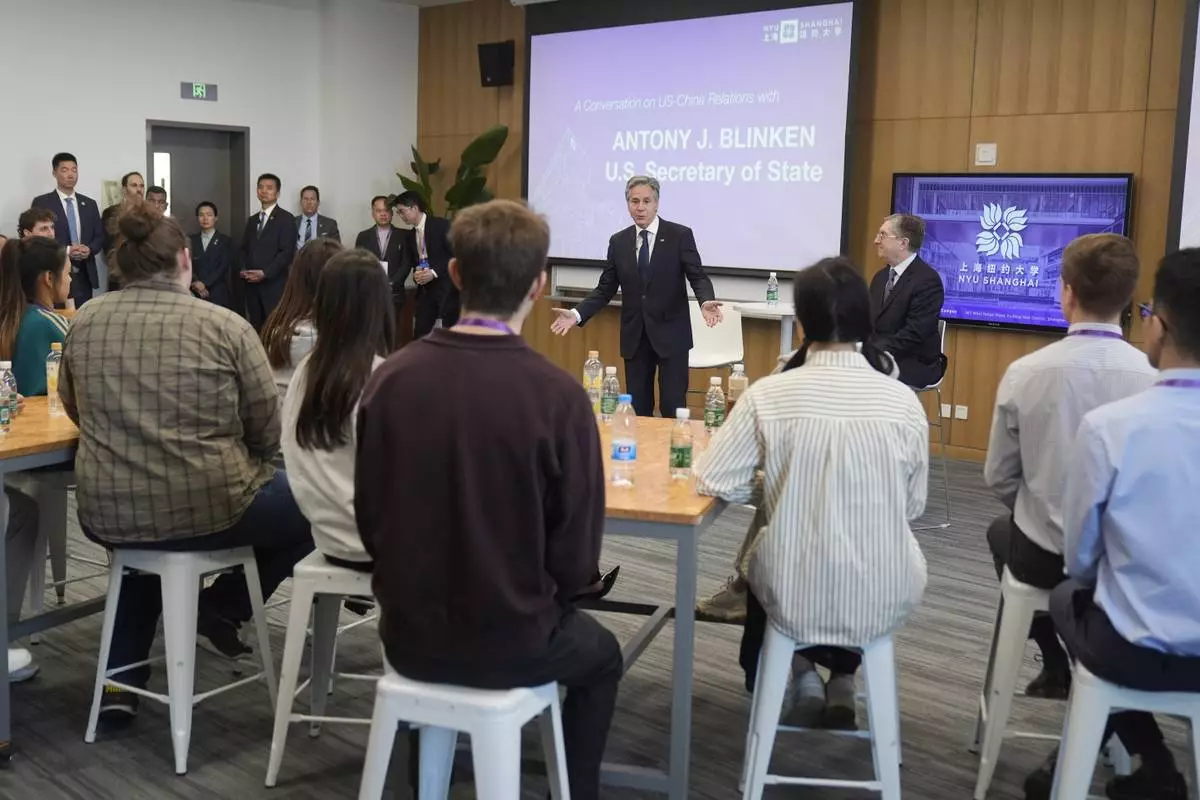
U.S. Secretary of State Antony Blinken, center, with NYU Shanghai Vice Chancellor Jeffrey Lehman, back right, talks to students at NYU Shanghai, Thursday, April 25, 2024, in Shanghai, China. (AP Photo/Mark Schiefelbein, Pool)
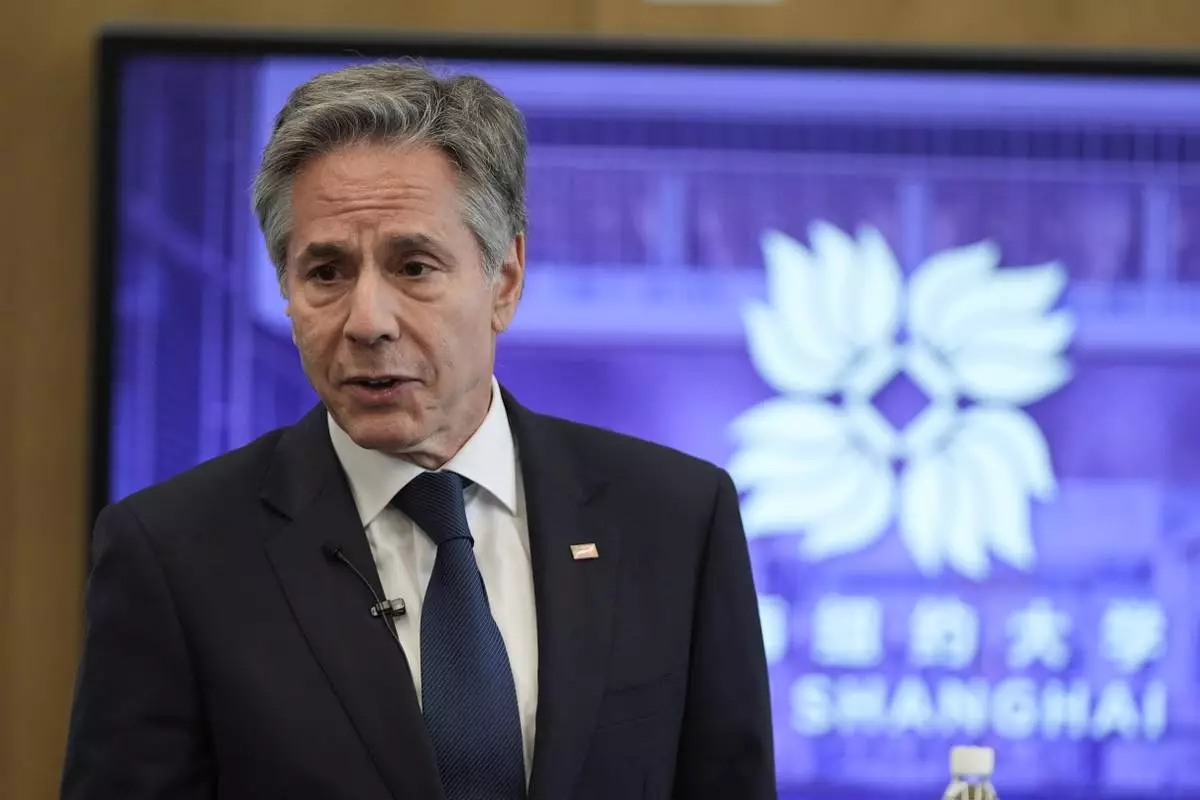
U.S. Secretary of State Antony Blinken talks to students at NYU Shanghai, Thursday, April 25, 2024, in Shanghai, China. (AP Photo/Mark Schiefelbein, Pool)
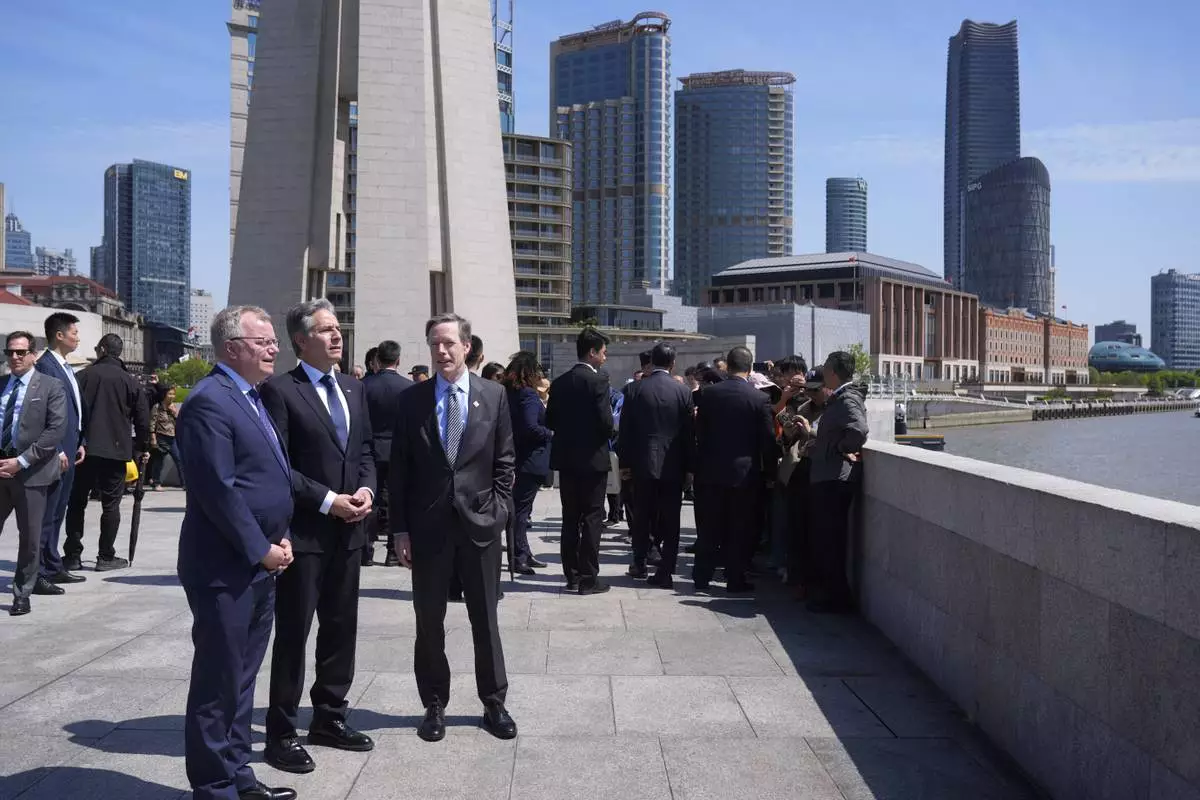
U.S. Secretary of State Antony Blinken, second left, U.S. Ambassador to China Nicholas Burns, third left, and Scott Walker, left, Consul General at the U.S Consulate General in Shanghai, visit a waterfront area called The Bund, Thursday, April 25, 2024, in Shanghai, China. (AP Photo/Mark Schiefelbein, Pool)
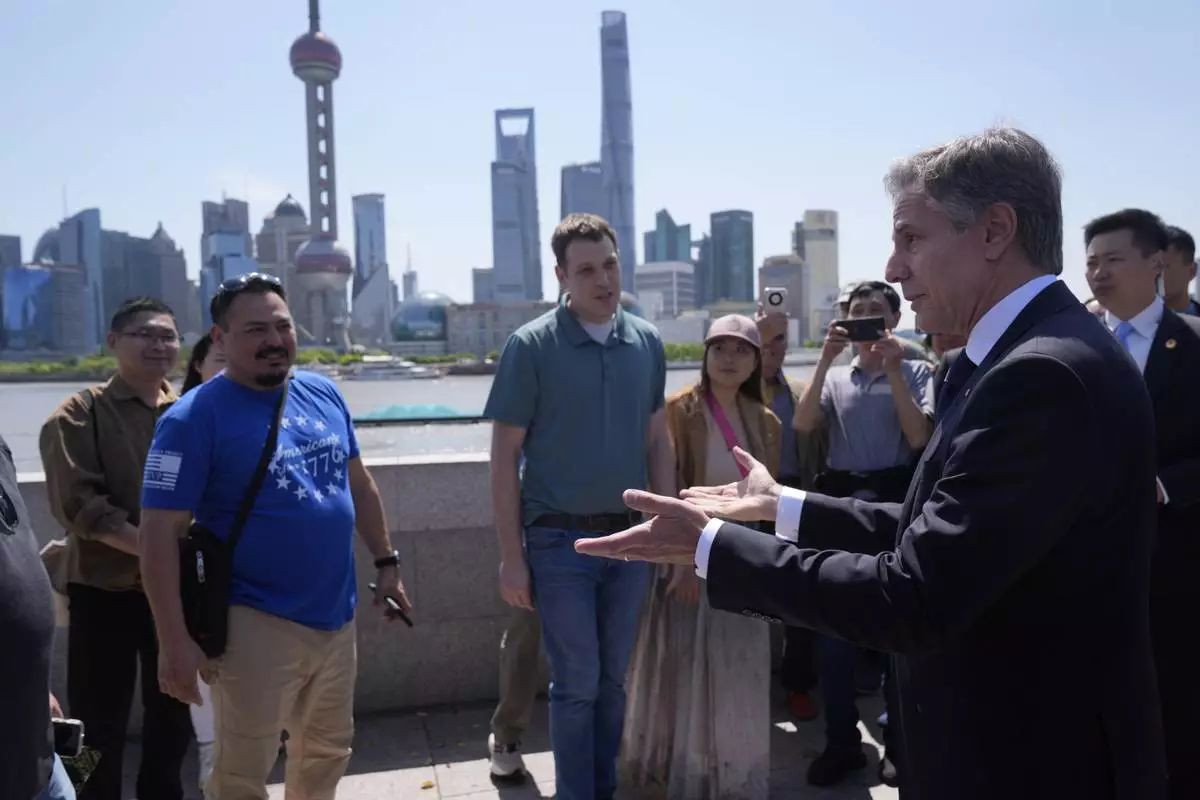
U.S. Secretary of State Antony Blinken, right, talks with U.S. tourists as he walks in a waterfront area called The Bund, Thursday, April 25, 2024, in Shanghai, China. (AP Photo/Mark Schiefelbein, Pool)
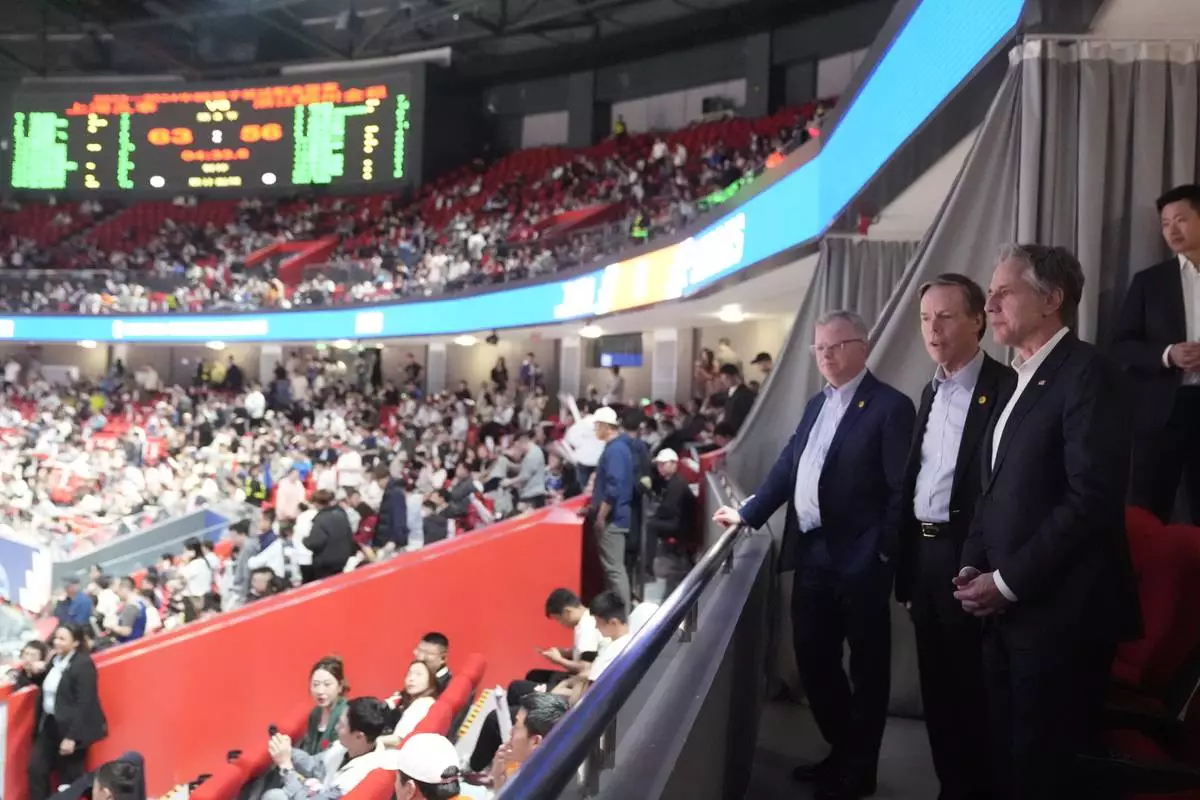
U.S. Secretary of State Antony Blinken talks with U.S. Ambassador to China Nicholas Burns, center, with U.S. Consulate General in Shanghai Scott Walker, left, while attending a basketball game between the Shanghai Sharks and the Zhejiang Golden Bulls at the Shanghai Indoor Stadium, Wednesday, April 24, 2024, in Shanghai, China. (AP Photo/Mark Schiefelbein, Pool)

U.S. Secretary of State Antony Blinken talks with U.S. Ambassador to China Nicholas Burns, center, with U.S. Consulate General in Shanghai Scott Walker, right, while attending a basketball game between the Shanghai Sharks and the Zhejiang Golden Bulls at the Shanghai Indoor Stadium, Wednesday, April 24, 2024, in Shanghai, China. (AP Photo/Mark Schiefelbein, Pool)
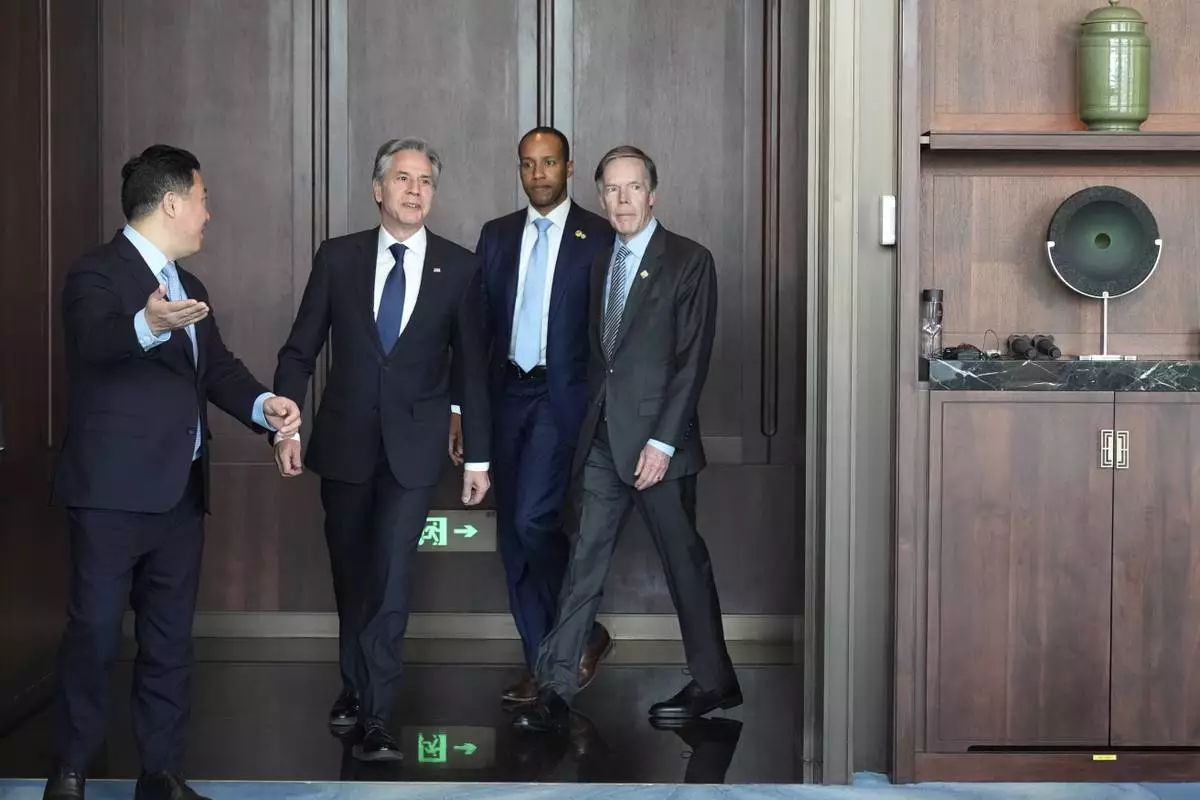
U.S. Secretary of State Antony Blinken, second left, and U.S. Ambassador to China Nicholas Burns, far right, arrive at the Grand Halls to meet with Shanghai Party Secretary Chen Jining on Thursday, April 25, 2024, in Shanghai, China. (AP Photo/Mark Schiefelbein, Pool)
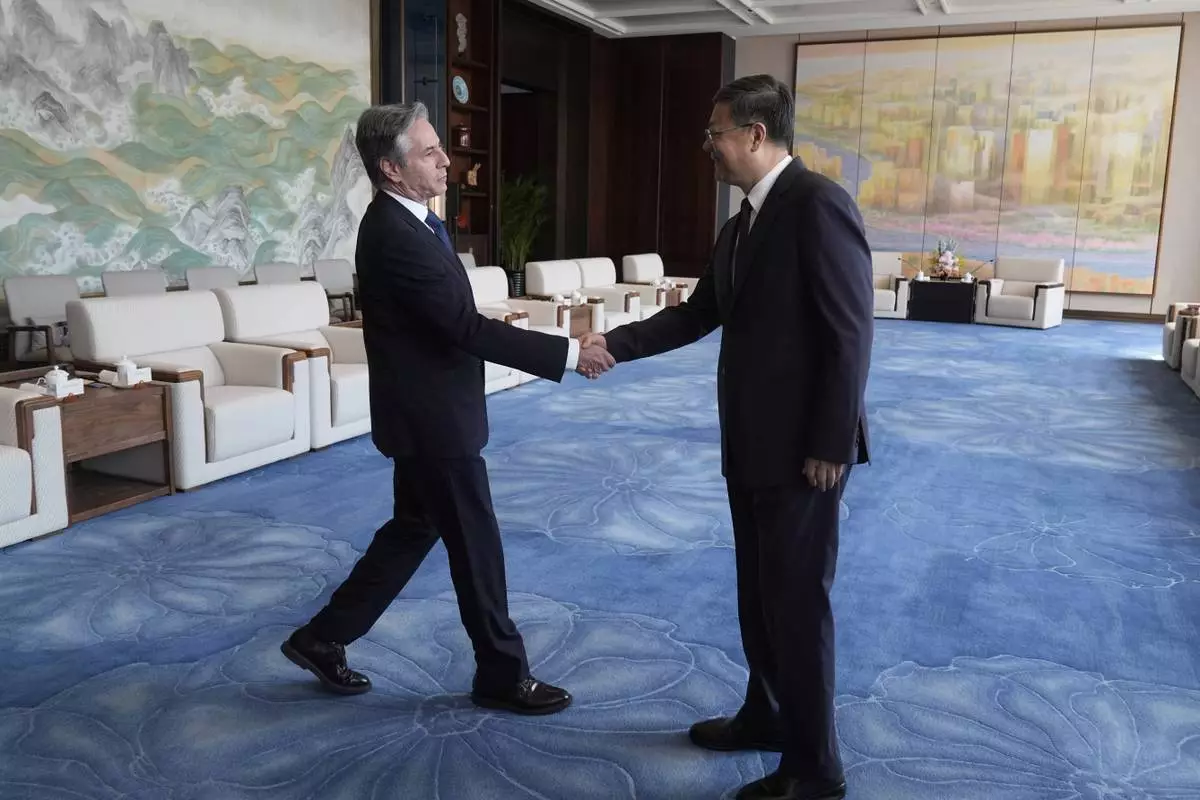
U.S. Secretary of State Antony Blinken, left, shakes hans with Shanghai Party Secretary Chen Jining as they meet at the Grand Halls, Thursday, April 25, 2024, in Shanghai, China. (AP Photo/Mark Schiefelbein, Pool)
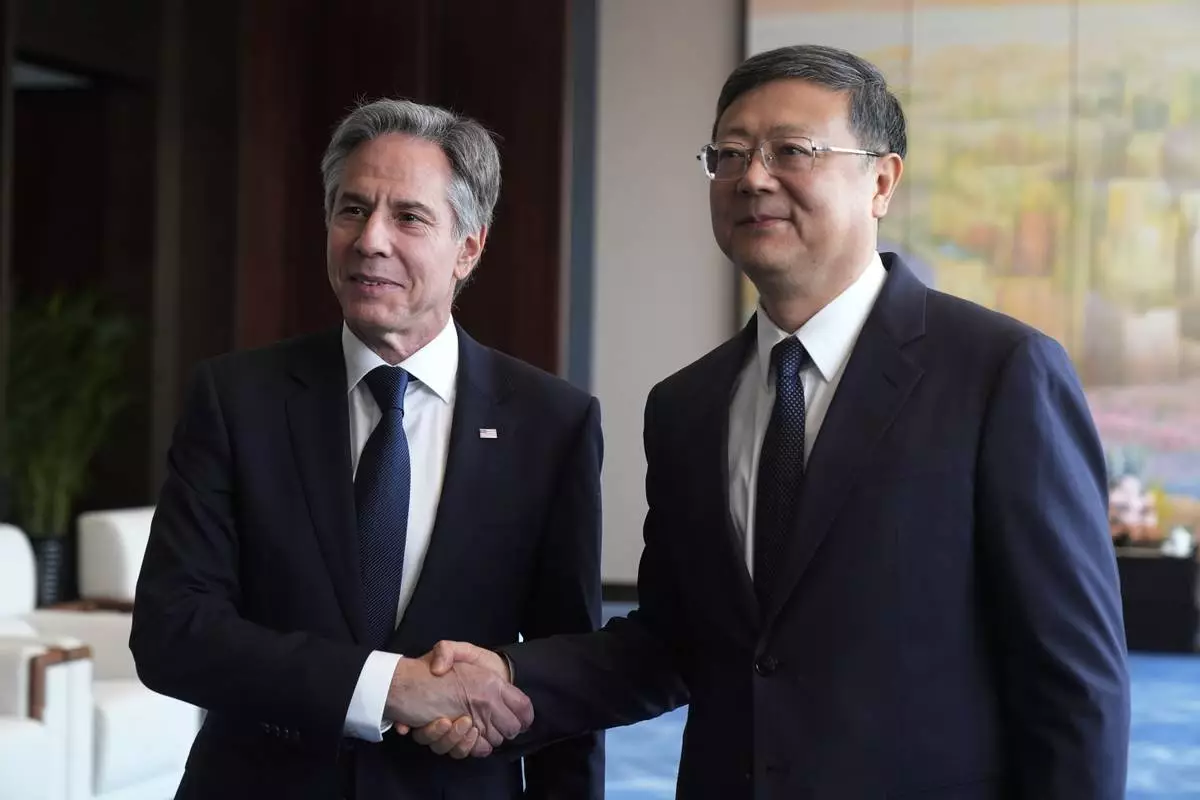
U.S. Secretary of State Antony Blinken, left, meets with Shanghai Party Secretary Chen Jining at the Grand Halls, Thursday, April 25, 2024, in Shanghai, China. (AP Photo/Mark Schiefelbein, Pool)
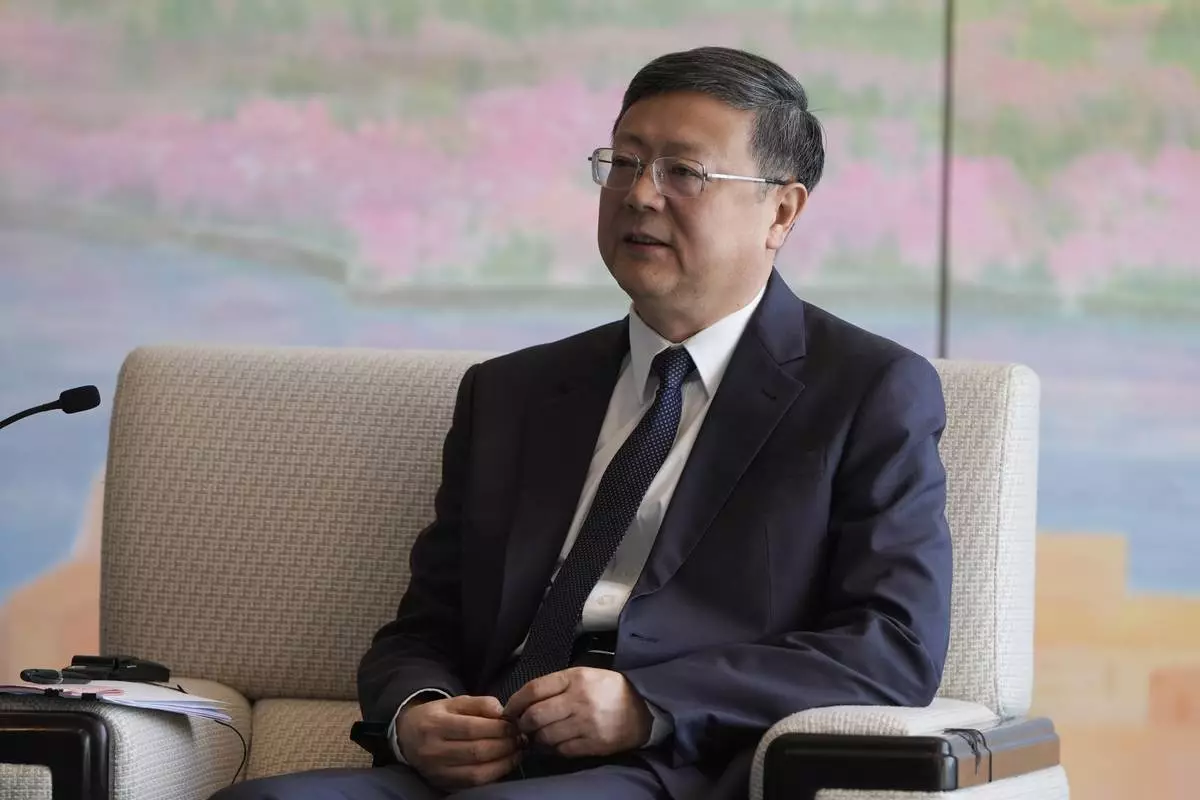
Shanghai Party Secretary Chen Jining talks with U.S. Secretary of State Antony Blinken at the Grand Halls, Thursday, April 25, 2024, in Shanghai, China. (AP Photo/Mark Schiefelbein, Pool)
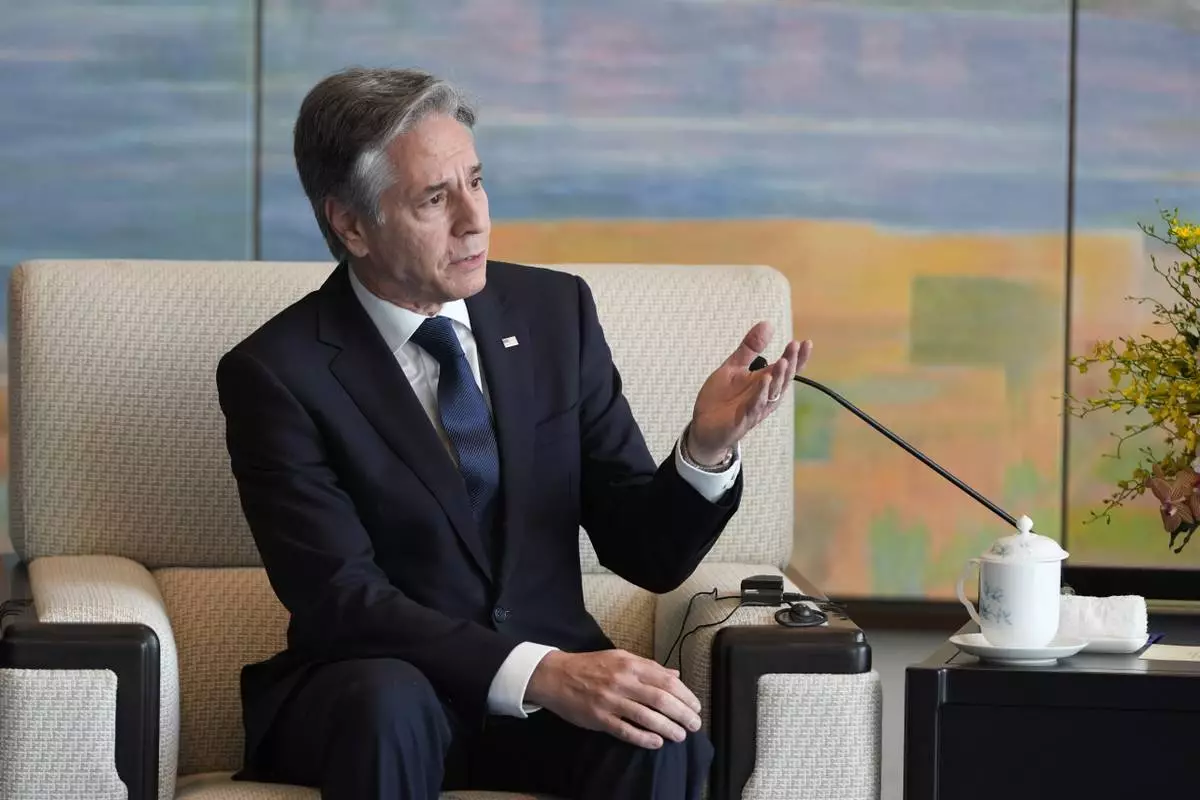
U.S. Secretary of State Antony Blinken talks with Shanghai Party Secretary Chen Jining at the Grand Halls, Thursday, April 25, 2024, in Shanghai, China. (AP Photo/Mark Schiefelbein, Pool)
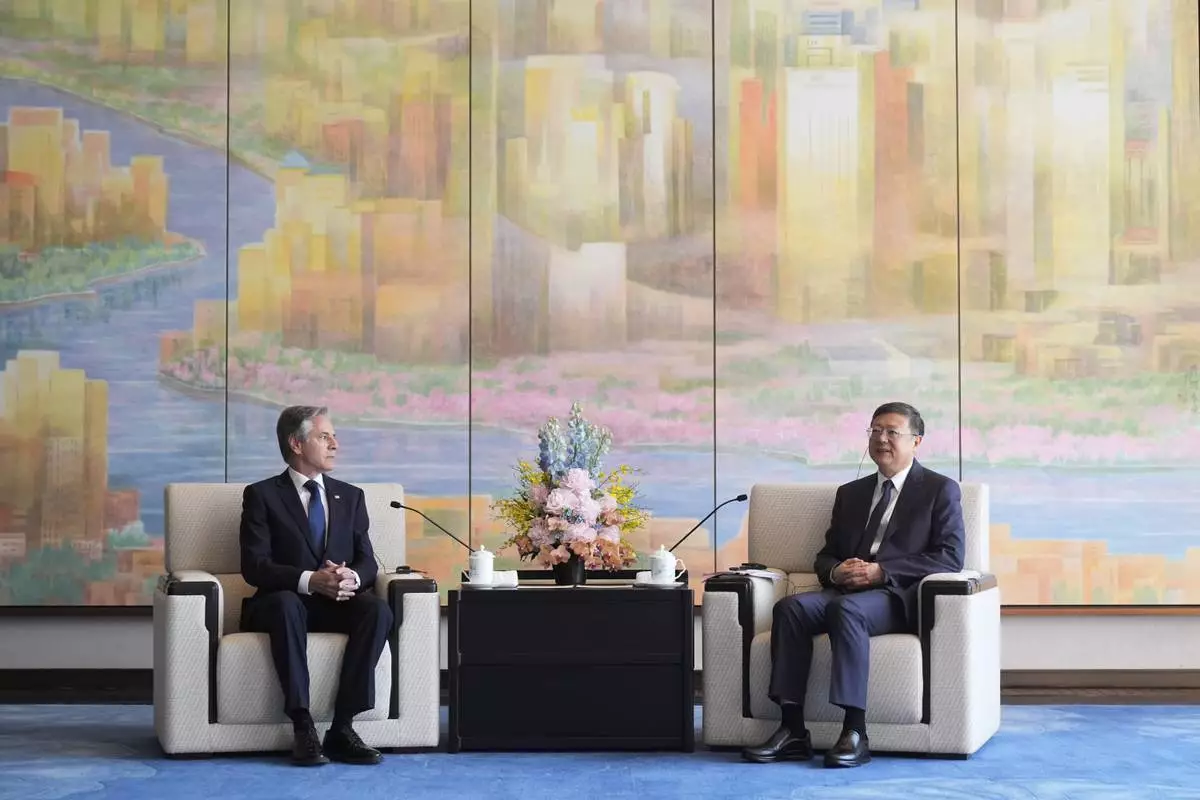
U.S. Secretary of State Antony Blinken, left, talks with Shanghai Party Secretary Chen Jining at the Grand Halls, Thursday, April 25, 2024, in Shanghai, China. (AP Photo/Mark Schiefelbein, Pool)
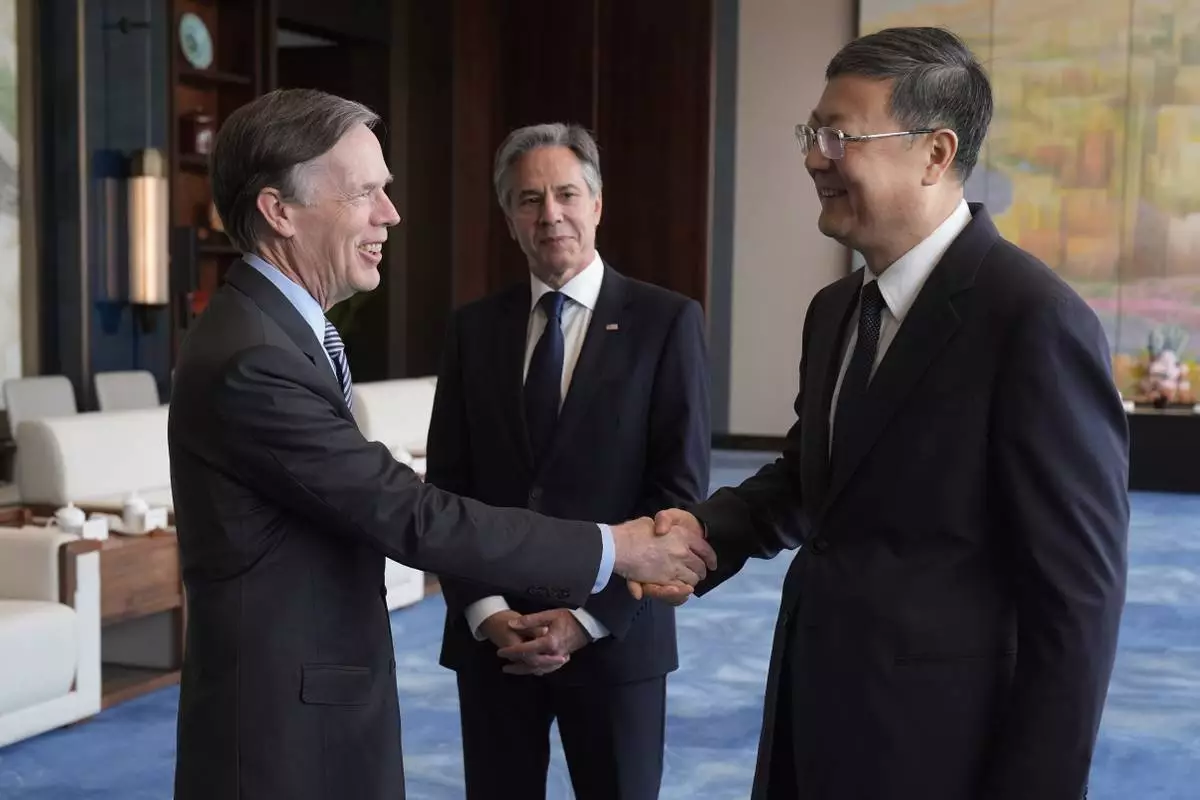
U.S. Secretary of State Antony Blinken, center, watches U.S. Ambassador to China Nicholas Burns, left, shake hands with Shanghai Party Secretary Chen Jining at the Grand Halls, Thursday, April 25, 2024, in Shanghai, China. (AP Photo/Mark Schiefelbein, Pool)




















